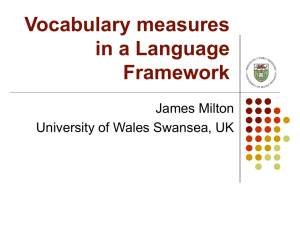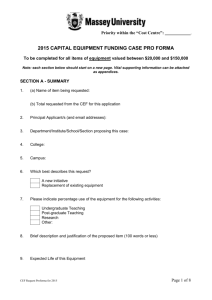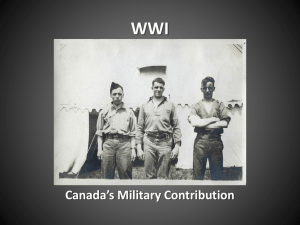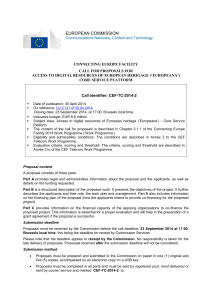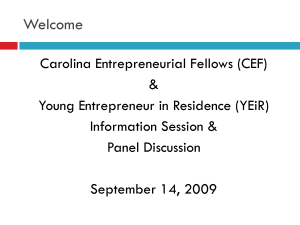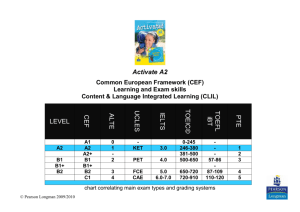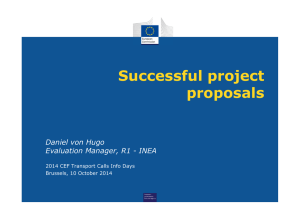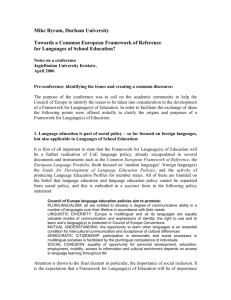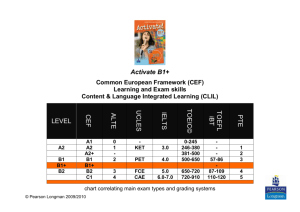CEFR in practice: promises and problems
advertisement
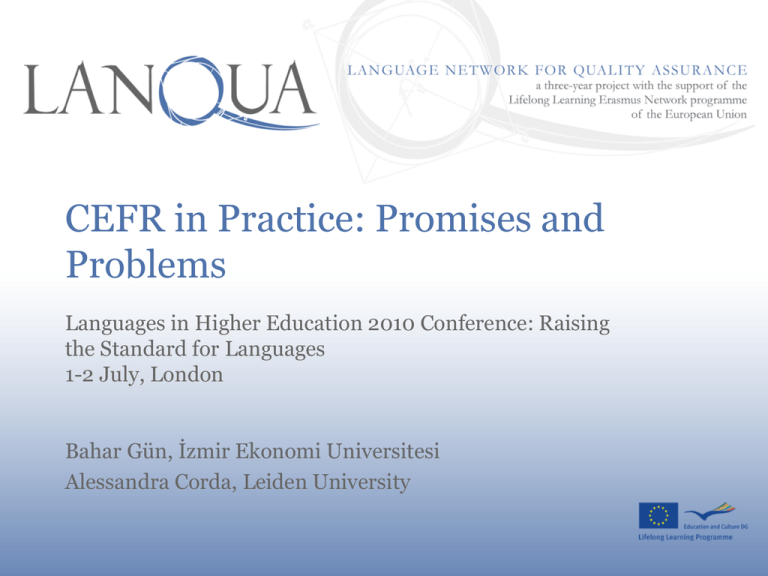
CEFR in Practice: Promises and Problems Languages in Higher Education 2010 Conference: Raising the Standard for Languages 1-2 July, London Bahar Gün, İzmir Ekonomi Universitesi Alessandra Corda, Leiden University Outline • Introduction • How do we know that the promises of the CEF really work? • Problems: – How do teachers correctly assess students’ performance with the CEF? – How can you train teachers in using the CEF? The CEFR, what is this exactly? • A framework for language learning, teaching and assessment • Council of Europe, 2001: large document (264 pag .) • Aim: more transparency and comparability • Six competence levels The CEFR competence levels A1 A1, illustrative scale for overall spoken interaction A2 Can interact in a simple way but communication is totally dependent on repetition at a slower rate of speech, rephrasing and repair. Can ask and answer simple questions, initiate and respond to simple statements in areas of immediate need or on very familiar topics B1 B2 C1 C2 B2, illustrative scales for vocabulary range and vocabulary control Has a good range of vocabulary for matters connected to his/her field and most general topics. Can vary formulation to avoid frequent repetition, but lexical gaps can still cause hesitation and circumlocution The Context • An English medium university • Twelve hundred students in the preparatory year • A hundred plus English language instructors • A new modular approach to course design • A “Gateway” exit test to the next level Why Assessment Tasks? • From summative assessment toward a more formative approach • Encourage learning through feedback The Process • • • • • Input to output One afternoon, twice a module Individual feedback slots Written feedback Referral to Self Access Centre What do our students think about AT feedback? Informal feedback on AT feedback with four DST (Mod 3, March 2010) students, three who attended group feedback, one who did not What did you find useful about feedback? Student 1 I like your comments sheet. I noticed my mistakes. Student 3 Writing again helped me to learn One of you wrote your text three times. Two of you wrote your texts twice, after I pushed you a bit! Student 3 Doing feedback in a small group was very nice. It should be like this. Student 1 Working face to face with the teacher is good. Student 2 We didn’t write again, we’re not used to it. I will definitely write my text again in the future. Performance Checklist (Teacher version) Teacher’s Name: R. L. Student’s Name: A. G. Class: CO 1 Level C: Listen and take notes in an outline / Write descriptive text Remember the purpose of this form is NOT to give a grade/mark to the student. It is to form the basis of your discussion with the student in the individual feedback session. After the session, give this copy to the student. Listening and Note-taking Weak OK Good 1. Student could complete the outline. Writing Weak 1. Student used the information from the outline. 2. Student’s range of vocabulary was appropriate for the level. 3. Student’s control of grammar was appropriate for the level. 4. Student used “and, but, also, when” to join sentences where necessary. 5. Student’s spelling was accurate. 6. Student’s use of capital letters and punctuation was accurate. Excellent √ OK Good Excellent √ √ √ √ √ √ Areas the student needs to work on: Congratulations, Ali. You completed the task successfully, taking good notes and using this information to write about Cape Town. In the listening and note taking lessons you pay attention and participate well. You are getting good at taking notes. I found your writing easy to follow and I think this is because you organise information logically and there were no serious grammar problems. Think about: i) How to use punctuation accurately while using the connecting words. Sometimes you need a comma, sometimes you don’t. ii) Divide your writing into logical paragraphs Action plan To improve your grammar study time adverbials (when +simple present). Find some practice exercises for the connecting words (and correct punctuation) in your workbook or at the SAC. Use your dictionary to help you learn words and phrases e.g . 1000 metres high, rain (n) (not raining). Also look at the “Centre” pages e.g. 41. Practice writing sentences with connecting words using correct punctuation. Please write your guidebook entry again and give back to me Monday. Ask me or Kamer if you need help. Feedback Date: __________________ Teacher’s Signature: ______________ Student’s Signature: ______________ SAC SAC Feedback Date: __________________ ______________ SAC Signature: What the students say Can you tell us if the feedback helped you? Ali ...we worked on these points, but then, other points appeared to work on. I didn’t put myself into it when I was supposed to write the second draft. ...when Rob clarified the areas better, I wrote a better text. I made fewer mistakes. Gulşah ...it was good to rewrite. As Ali said, it helped us both to work on writing and to see the points to improve. Spin-offs and side effects In addition to completing the task, the feedback helped you use English better. Can we say this? Ali: I’ve been more careful about using articles when speaking and writing. I also tried to write things in better English. Gülşah: I got more out of it than I expected. I made a mistake in the use of ‘which’. When Rob showed me how to use it, and also ‘when’, I corrected them. CEF as quality insurance instrument • How can students achieve a CEF competence level? – Teachers professional development, CEF familiarisation – Right amount hours of instruction How many hours of instruction? Tschiner, E. (2005) Das ACTFL OPI und der Europäische Referenzrahmen, Babylonia, 2, 50-55. ACTFL CEF French, Spanish German Nov high A1 Int mid A2 240 IL/IM 480 IL/IM Int high B1 480 IH/AL 720 IH/AL Adv mid B2 720 AM/AH 1320 AM/AH Adv high C1 CEF as quality insurance instrument • How can you prove that your students achieve a CEF competence level? – Internationally recognized language certificates related to the CEF Teachers familiarisation instruments • CEFR “games” • Websites for online training An example from www.erk.nl www.webcef.eu: collaborative evaluation of oral language proficiency CEFtrain: http://www.helsinki.fi/project/ceftrain/index .html, familiarisation activities with the CEFR Thanks for your attention Contact: Alessandra Corda, Leiden University acorda@iclon.leidenuniv.nl Bahar Gün, İzmir Ekonomi Universitesi bahar.gun@ieu.edu.tr

